Competition Spy - 2nd stage
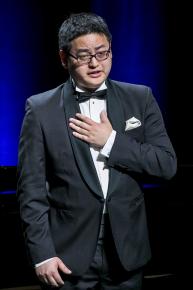
Chaoran Zuo opened The second round of the Competition. Together with Laura Kluwak-Sobolewska at the piano, they started with a song by a Chinese composer Huaijian Wang. Their rendition was so magical, that it brought smiles on faces of people in the audience. It was obvious that the young artist felt very comfortable singing in his mother tongue. Accompanied by piano sounding like chirping of birds, he created an atmosphere and showed great musicality, in both, the verses and the refrain which was hummed with a beautiful, sonorous murmurando. Following pieces seemed less comfortable for him. In Macduff’s aria, it was noticeable that he still doesn’t have the maturity to express the feelings of a father whose wife and children have been murdered. The voice is not full enough and some sounds lost their color. The same happened in Jontek’s aria, although it is worth appreciating that Mr Zuo understood every word he sung in Polish, which was clear to see in his interpretation, and he had a very good pronunciation.
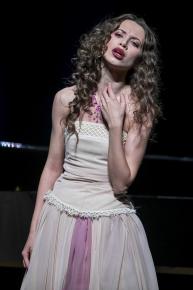
Young, Romanian soprano, Diana Alexe is as pretty as the color of her light, yet darker sounding voice. The impression was that she sings with great ease, although her voice broke on the last notes of Gilda’s aria. In my opinion this didn’t manage to spoil the overall impression. Ms Alexe often used portamento in both, Verdi’s aria and in Ludomir Różycki’s waltz Caton. In her rendition of Virginia/Red River song byT. Ades, the pronunciation wasn’t clear enough for the audience to fully understand the lyrics. Her interpretations were convincing, although she had a repetitive head movement to the sides, which made the impression that she is listening to the melodies she is singing.
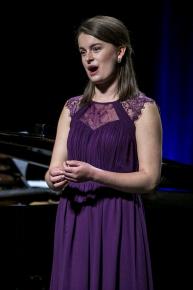
Soprano, Katarzyna Belkius, showed a lot of technical abilities. In the very beginning she had some unstable sounds, as though she needed a moment to take control over the competition stress. In Linda’s aria there were some passages, were the voice sounded a bit tense. In spite of big possibilities, which come with a stable technic, there was not enough interpretation and phrasing. For example in Paweł Łukaszewski’s song Głosy ptaków już opadły, one music motiv often repeated, should provoke changes in dynamics. Linda didn’t seem to be in love, and it was hard to feel sorry for the moon in Szymanowski’s song Samotny Księżyc.
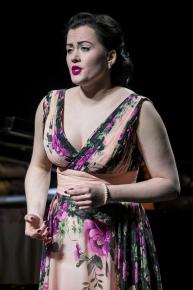
Soprano Aleksandra Borkiewicz made a big impression just by coming on stage - her bright dress with flower patterns looked great in the stage lights. Already from the first sounds of Crickets song, which initiated her performance, she drawn the attention of the public. She told the story of the crickets, in such a thrilling manner as though it were a passionate love story. Ms Borkiewicz has a very light voice, with nice sounding chest register. In both Hanna’s and Giulietta's aria, the interpretation was great and every gesture was subordinate with intentions. However, I had the impression that the voice is too light for these parts, although the artist was able to sing every phrase.
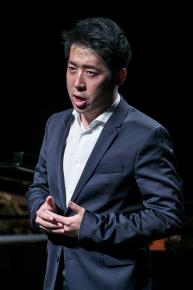
Hongyu Chen together with Tomasz Domański at the piano, took us on a music trip. Although Chinese baritone sometimes pushed the voice too much and placed unnecessary accents on some syllables, he managed to show so much musicality and expression. Additionally, his voice has such a beautiful color, that it was possible to forget you are listening to a competition and it felt as though it were a concert. At first Szymanowski’s music poured out in a song Wschód słońca composed to Dimitr Davidov’s poetry. Than tension was built in W. Rhim’s song Die Frau in mir with withheld pauses. At the end we could hear Italian cantilene in Cascart’s aria from R. Leoncavallo’s opera Zaza.
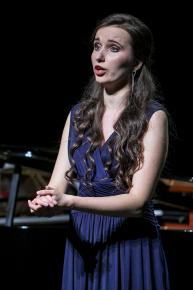
Soprano, Paulina Gocałek sung very gracefully, impersonating the fifteen year old Sophie from J. Massenet’s Werther. Her light voice sounded sweet in M Lorenc’s Ave Maria, which in her rendition was kept in piano dynamics. This is a proposition of an interpretation of this piece, which I could imagine could also be sung with a bit broader sound in some moments. Ewa’s aria from S. Moniuszko’s Hrabina, seemed to cause Ms Gocałek a bit of technical difficulties. During the whole piece she kept stepping in place and she lost control over it especially in descending passages. She forgot the music for a moment, and quickly found her way back, however this didn’t seem to be the reason of her troubles. A choice of less demanding repertoire could have enabled her to leave a better impression.
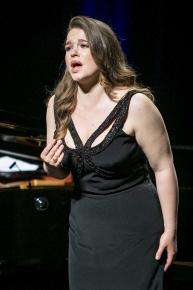
Gabriela Gołaszewska seduced with her warm sounding, full lyric soprano. However, not only the beauty of the voice is worth appreciating, but also the way she operates with it. In P. Mykietyn’s song Why didst thou promise, she started sounds with a straight piano which she later developed into a fuller sound. She used the same method to suspend the high notes in Magda’s aria from G. Puccini’s opera La rondine. Ms Gołaszewska is undoubtedly very musical, however sometimes her diction was not clear enough. As the last piece, she presented Cunegonde's aria from L. Bernstein’s Candide. Her Cunegonde is very feminine and alluring, however seemed somewhat too sane. It is impressive that with such a full voice, she sings coloratura passages this well.
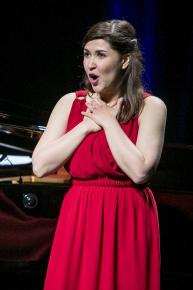
Paulina Horajska is certainly endowed with a great temperament. Sometimes this temperament provoked her to exaggerated gestures, which took place in Rosina’s aria, sung as her first piece. She made the audience laugh, with great interpretation of song Piec by M. Łopacki. Lakme’s aria was more subdued in expression, sung with grace and musicality. For most of the performance, there was a lot of air in Ms Horajska’s voice, except for more dramatic moments, when the voice clearly gained more aliquots. Maybe if her voice was more satuard during the whole performance, she would be able to express herself even better. The young singer is surely an artist with something to convey.
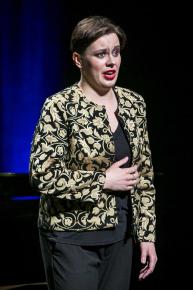
Once more we were taken away from the competition, to a concert hall by mezzo-soprano, Elwira Janasik, together with Bartłomiej Wezner at the piano. Their performance began with Sonata Belzebuba by W. Pawlik, where the soloist pinned the audience to their seats with her gesture, voice and perfectly delivered text. This was followed with Dido’s plea not to be forgotten once she is gone. Ms Janasik began the recitativo sung in a frozen pose, turned with her side to the audience. In this aria her exceptionally dark coloured, beautiful voice seemed to lose some of its unique quality as she sung piano. In spite of this, her interpretation moved the audience. Dalila’s aria was equally emotionally sung, with great legato. Ms Janasik is definitely gifted with a big stage personality.

Tenor, Piotr Kalina started his performance with Pollione’s aria. Technical shortcomings prevented the soloists from delivering an interesting interpretation. The whole was sung with too much strength, which cause the high notes to sound strained, and the low register to be sounding much quieter than the rest of the voice. In R. Strausses Allerseelen song, Mr Kalina started a bit more gentle, but his voice seemed too tired from the effort in the previous aria, and there was not enough stamina for all the sounds to come out properly. It is worth noticing, that the last composition was surprisingly sad, for such a young composer, S. Rzepiela, who was born in 1993.
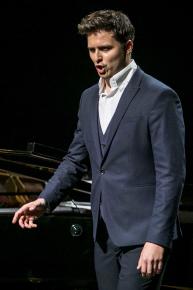
Baritone, Łukasz Karauda began with Venus of the East by Tan Dun. He showed beautiful phrasing, clear diction and warm sounding, velvety middle voice, which unfortunately lost its color in the higher register and was sung with visible effort. Song Nie płacz nade mną by M. Karłowicz was performed nicely. The biggest impression was made by his rendition of Aleko’s aria, where Mr Karauda showed a lot of sincere emotion and a well thought through interpretation.
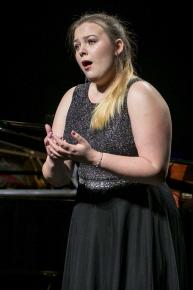
Mezzo-soprano, Paula Kluczna began with I. Paderewski’s song Un jeune patre, sung with a very good French pronunciation, which often poses a big challenge to singers. Modern song Cisza by A. Nowak was performed very gracefully, however sometimes the voice gained a quick vibrato, especially on the high notes. Dalila’s aria lacked a bit of magnetism, the voice is too light to fill out wide phrasing in this composition.
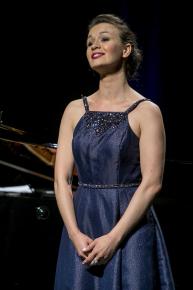
Soprano, Klaudia Korzeniewska began after a break in the auditions with great energy, making the audience smile with L. Larsen’s song Billy the Kid. Than she lulled them with L. Różycki’s lullaby A..a kotki dwa. She sung with musicality and a big sensitivity, however sometimes she darkened her sound, which made an impression of intonation problems. Her choice to end with Luise’s aria Depuis le jour was a bit surprising, as this is a very demanding piece. It has to be filled with great sensuosity, and this cannot be done without conducting endless phrases and developing the long notes in a clear direction. Unfortunately we didn’t hear this.
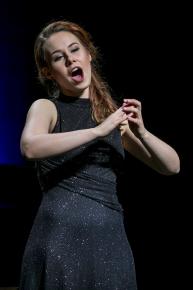
Soprano, Karolina Róża Kowalczyk, has a very light voice. She sang Linda’s aria with good intonation, gracefully and with great mobility of the voice. P. Łukaszewski’s song Wiosna was maybe a bit too low for her, but she dealt with it quite well. R. Quilter’s song Blow, blow thou winter wind, was performed with perfect diction. In her whole performance one could hope for a bit more diversified expression, not only the one based on Ms. Kowalczyk’s undeniably charming smile.

Tenor, Maciej Kwaśnikowski, has an impressive control over his voice. In Shepherd’s aria he conducted elegant phrases, singing with a very evened out emission, great diction, impressing everyone with diminuendo on high notes. E. Pessen’s song Poem 99 was sung piano and with enchanting modesty in means of expression, proving that less is more. Gerald’s aria, although sung very correct, gave a foretaste of how beautifully he will sing it once his voice matures with time and experience.
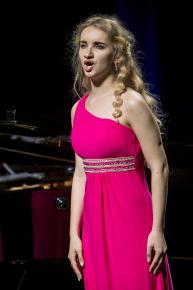
Very young soprano, Oksana Likarenko, born in the year 1997, showed beautiful, fresh soprano voice, with an evened out emission and great possibilities. Although it is audible that she is still very young, she is already quite capable vocally, as well as graceful and expressive on stage. Already from the first sounds of the accompaniment, she began impersonating the capricious Norina. Although in G. Donizetti’s aria her high notes were not yet as full as they could be, and her voice lacked the volume and maturity in the song Rajski ptak, sweetness of her sound and honest expression made the performance a very pleasant one. In the last piece, Harmonie by J. M. Abras, Ms Likarenko coped very well with changes from liryc expression, to a more feisty one.
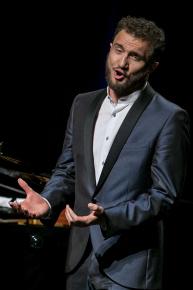
Baritone, Jakub Łęczycki’s performance was an expressive one. He is a charismatic artis, he interprets well, not only with his gestures and mimics, but also modulating his voice. He will surely be able to express even more, once his voice becomes more saturated. During his singing, the voice was airy and it was breaking in the lower register. Both Malatesta’s aria and Simon’s aria from Haydn’s oratorio were sung with energy, however choosing an aria with as many verses as the latter one, is not a best choice for a competition. Song by a young composer F. Pinczewskiego, born in the year 1993, was very sad, and the chromatics exposed technical deficiencies of Mr Łęczycki.

Soprano, Maria Malinowska, has a nice voice and a lot of charm. However she sang with a vibrato and pitch problems. She sang Musetta’s Waltz and Rusalka’s Song to the Moon showing musicality and sensitivity, but her technique didn’t allow to fully enjoy the quality of her voice. Last piece sung by Ms Malinowska, A ty moje oczko by A. Rocławska-Musiałczyk, sounded much more grounded. She seemed to feel more comfortable in it which enabled her to render a very good interpretation, bringing smiles on the faces of the listeners.
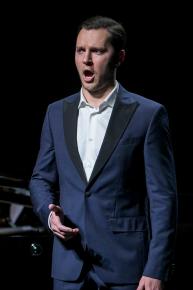
As the first piece, baritone Danylo Matviienko, presented Alfonso’s aria from La favorita. There seemed to be too little interpretation and giving direction to phrases. His voice is beautiful, but the higher register sounded strained. It was easier for Mr Matviienko to control his voice in the song Poem 1775 by E. Pessen. This enabled him to catch the attention of the audience and create atmosphere. Especially in this piece he showed great diction. He offered a nice interpretation of the song Kozak by S. Moniuszko. The aritis could have had a more expressive body language. By placing his feet so close together, his posture seemed passive.
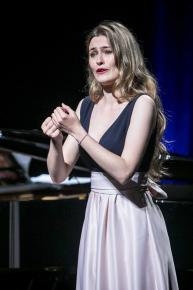
Coloratura soprano, Ewelina Osowska, was one more person this day, who took the listener on a trip to her own world, far from the audition room. She began with Amina’s aria from La sonnambula. She sang the first part very focused, piano, conducting elastic, long phrases. In the faster part she showed off with the agility of her voice in the coloratura passages and the beauty of her high notes. In P. Mykietyn’s song Whoever hath her wish, a clear diction was missing which made it very difficult to understand the words. It was the weakest part of the program although it was still sung with good intonation and ably. Ms Osowska gave an energetic show in Cunegonde's aria. This for once was an unstable Cunegonde, coming from one extreme to the other. The ultra sounds which Ms Osowska presented, were not only impressive when it comes to pitch, but also when it comes to the richness of aliquots. In this aria there was no problem with understanding any word being sung, or spoken.
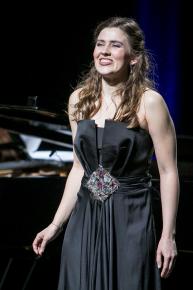
Soprano, Anna Parysz, began with Morgana’s aria, which she sang in a very elegant manner, gracefully operating her light, bright sounding voice. Adela’s aria followed, and here MS Parysz got caught in a trap of so called operetta stylistic and exaggerated with gesticulation. Vocally the aria was sung well, with good German pronunciation. The oniric song Ein Traum by P. Szymański, accompanied beautifully by Paweł Sommer at the piano, lacked more dynamic differentiation. Although the voice sounded sweet, this monotonous sweetness was not enough to really intrigue the listener.
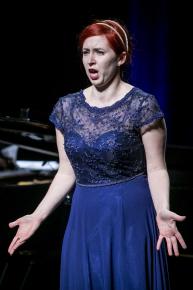
Soprano, Małgorzata Pawłowska, in this competition singing repertoire in the dramatic soprano fach, took the listeners far from their everyday lives. She began with a song Evil like me from Descendants film, immediately proving she has stage personality. Her gestures were well thought through, as well as her musial interpretation. Perhaps she could have mixed in the chest registers a bit more to accomplish more of a musical sound. Second piece she presented was Elisabeth’s aria from Tannhäuser. Although Ms Pawłowska dealt very well with this piece (only at the very end some strain in her voice was audible) it might be dangerous for such a young singer to reach out for this heavy repertoire. Her Halka was extremely convincing. She acted very intensely, which was moving and sincere, so sincere that it is hard to say if it was make up, or a tear that shone on her cheek.
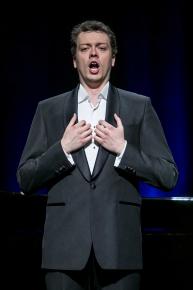
Young bass, Michał Rudziński, began with Silva’s aria, showing a beautiful voice, which however is not yet ready for this repertoire. Not only the passing time will be good for Mr Rudziński’s voice, but also work on his technique. It is already audible, that he is a singer with great potential, however he lacks in tools to deepen his interpretation. Sonata Belzebuba by W. Pawlik was sung with the use of all his capabilities. In the Song of the Viking Guest the voice lacked enough volume and abilities, necessary to convey the sound of waves crashing against the rocks.
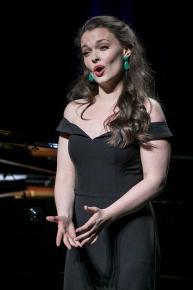
Soprano, Sarah Shine, was the only singer this day who mentioned the pianist, Manfred Schiebel, who performed with her. Ms Shine is very graceful and has a sweet sounding voice. However the voice doesn’t seem to carry well, and it sounds more as though it was schooled for song singing. Although in all pieces she delivered the text nicely and showed musicality, she lacked the full, operatic sound.
Barbara Zamek
photos Piotr Droździk